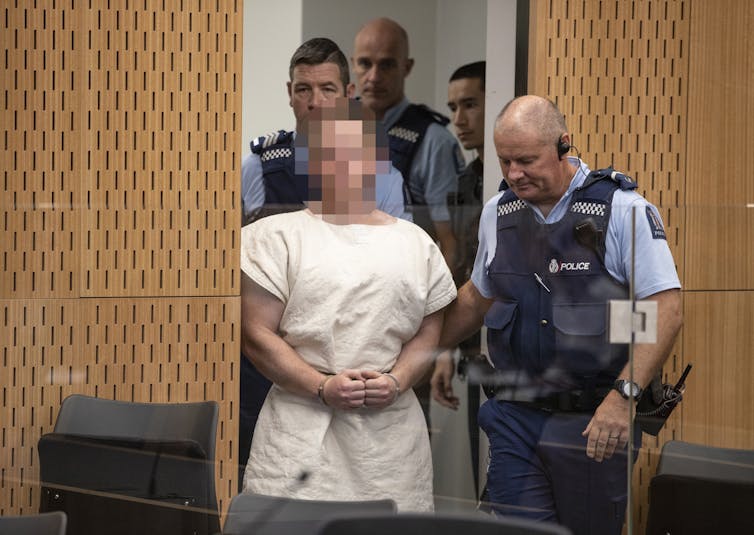How will the court deal with the Christchurch mosque killer representing himself at sentencing?
- Written by Kris Gledhill, Professor of Law, Auckland University of Technology
The sentencing of the Christchurch mosque killer was always going to be tense. Having admitted his guilt in March, his declaration that he would now represent himself at the hearing on August 24 only adds to that tension.
Can he do this? Essentially, yes. Legal representation is a right, but people can choose not to exercise a right. His lawyers informed the court of his wish to represent himself and the judge, Justice Mander, allowed them to withdraw from the case – after checking that the defendant was clear about waiving his right.
The criminal courts deal with horrendous cases regularly, so squeamishness cannot be the touchstone for what is permitted.
Parliament has introduced some limits. For example, the Evidence Act 2006 prevents defendants in sex cases and family violence cases from cross-examining the complainant. Nor can they question child witnesses without the court’s permission.
The importance of victim impact statements
More pertinent to this case, there are limits relating to victim impact statements under the Victims’ Rights Act 2002, which prevents defendants from keeping those statements.
The Christchurch killer’s sentencing hearing is set to last several days in large part because of the number of victim impact statements that will have to be presented.
The judge can direct that statements not be shown to the defendant to protect the safety or security of the victim, but that material cannot then be taken into account at sentencing.
This in turn explains why defendants are entitled to see statements – they are designed to have an effect on their sentence. It would not be a fair trial if the defendant was subject to secret evidence, and any impression there has not been a fair process is to be avoided.
Read more: Explainer: will life mean life when the Christchurch mosque killer is sentenced?
The role of stand-by counsel
Multiple issues of law may arise in this sentencing. For example, who is the “victim” of a terrorism offence and so allowed to give a victim impact statement? Is it the entire Muslim community?
The most obvious question is whether this crime merits a whole life sentence. A life sentence is inevitable given the number of murders and the terrorist motivation. But will this be the first time a New Zealand judge declares there will never be eligibility for parole?
To assist the court the judge has said “stand-by counsel” will be appointed. Their job will be to help the court reach a correct decision on those questions of law.
They may also be asked to help identify points in favour of the defendant from medical and pre-sentencing reports, and perhaps ensure that victim impact statements address what the law permits.
 The then-accused Christchurch killer appeared in court after the shootings, but has appeared by video link since.
AAP
The then-accused Christchurch killer appeared in court after the shootings, but has appeared by video link since.
AAP
Will the defendant appear in person?
Because the person speaking for the defendant is the defendant, this may affect some rulings. Firstly, it may be more likely he attends in person.
The defendant has already appeared before the High Court via audio-visual link. Under the Courts (Remote Participation) Act 2010, this is permitted in most instances. While it can’t be used for a trial unless the defendant consents, it may be used for sentencing if it is “not contrary to the interests of justice”.
Although the defendant has confessed to the crimes, his sentencing hearing may still involve disputes about the facts of his offending, which could require a mini-trial to resolve them.
Read more: Life in prison looms for Australia's Christchurch gunman, now NZ's first convicted terrorist
There may be evidence called from the authors of medical and pre-sentencing reports. There may be disputes about the victim impact statements. And the defendant’s right to see those statements presents challenges if he is not there.
These and other issues that might arise will require a high level of confidence that an audio-visual link is suitable if the defendant indicates he wants to be present.
What are the risks of hate speech?
It’s unwise to speculate about the defandant’s motives for waiving the right to representation. Nevertheless, there may be legitimate concerns about any attempt by him to use the hearing to grandstand.
The key point here is that the hearing is not about his guilt but about the proper sentence. So, unless he can show that his guilty pleas were improper, the hearing will be concerned with a narrow range of issues governed by the Sentencing Act 2002.
This imposes a structure on the sentencing process. The judge needs to consider the facts of the offending, any aggravating factors and any mitigation that can be offered. As such, submissions and statements from the defendant have to be relevant to these issues. They will usually be notified in writing in advance.
The defendant’s motivation for his crimes is relevant to sentence. However, because he has admitted the terrorism charge, his motivation is not in dispute. That should allow the judge to control the hearing firmly.
A fair process is both possible and essential. Giving a terrorist murderer any grounds to complain about unfairness must be avoided.
Authors: Kris Gledhill, Professor of Law, Auckland University of Technology





